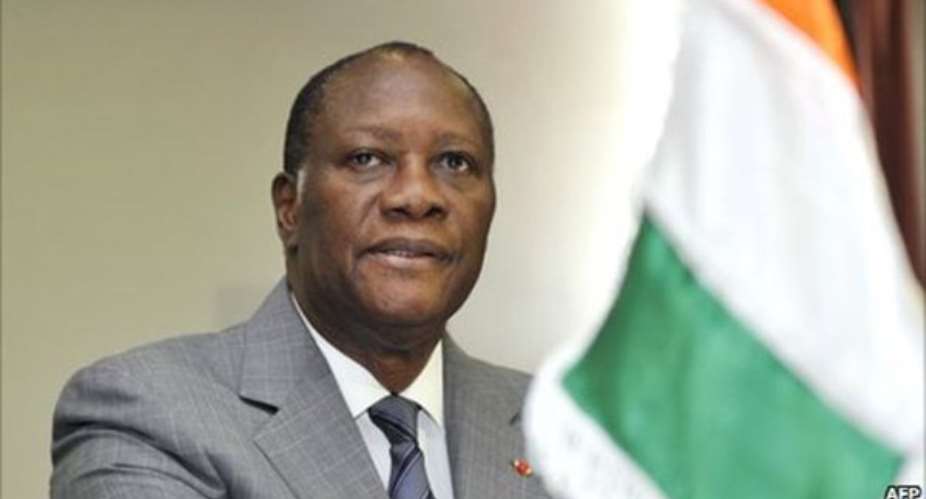Former Chief Executive of the Ghana National Petroleum Corporation (GNPC), Tsatsu Tsikata says Saturday's ruling on Cote d'Ivoire's application for injunction in the maritime dispute with Ghana has put the Ivorians in an even more difficult position.
He said although the substantive case is yet to be heard, the ruling which refused Cote d'Ivoire the provisional measures it sought from the International Tribunal on the Law of the Sea (ITLOS) has further strengthened Ghana's position and weakened that of Ivory Coast.
Côte d'Ivoire's request for the provisional measures was submitted to the Special Chamber of ITLOS On 27 February 2015. It requested the Special Chamber to prescribe provisional measures requiring Ghana to:
(1)take all steps to suspend all ongoing oil exploration and exploitation operations in the disputed area;
(2)refrain from granting any new permit for oil exploration and exploitation in the disputed area;
(3) take all steps necessary to prevent information resulting from past, ongoing or future exploration activities conducted by Ghana, or with its authorization, in the disputed area from being used in any way whatsoever to the detriment of Côte d'Ivoire;
(4) and, generally, take all necessary steps to preserve the continental shelf, its superjacent waters and its subsoil; and
(5) desist and refrain from any unilateral action entailing a risk of prejudice to the rights of Côte d'Ivoire and any unilateral action that might lead to aggravating the dispute.
At a public hearing, Ghana requested the Special Chamber to refuse Cote d'Ivoire all the provisional measures.
The Tribunal largely agreed with Ghana but granted one of the requests partly.
It said, "Ghana shall take all necessary steps to prevent information resulting from past, ongoing or future exploration activities conducted by Ghana, or with its authorization, in the disputed area that is not already in the public domain from being used in any way whatsoever to the detriment of Côte d'Ivoire."
Speaking on the ruling on Joy FM's Super Morning Show Monday, Tsikata explained that out of the five provisional measures requested by Ivory Coast from the Tribunal, only one was granted and even that was partially granted.
 arrieta Brew Appiah-Oppong
arrieta Brew Appiah-Oppong
Tsatsu Tsikata said Cote d'Ivoire has not been able to contest by evidence, the hitherto undisturbed history of the maritime boundary between the two neighbours.
Ghana's Minister of Justice and Attorney-General had argued on the history saying;
“Ghana and Côte d'Ivoire share a maritime boundary which has been mutually recognized for decades in numerous ways, although not formally delimited. This customary boundary is based on international law.
"Equidistance has been recognized by both sides as the basis for it. Mutual recognition of the border predates UNCLOS and it has been recognized for nearly three decades since".
"The equidistance based maritime boundary has been relied upon across a range of maritime activities. Ghana and Côte d'Ivoire have repeatedly represented to the world, over many years, including oil companies, that this is where the boundary lies and they have relied on that. Acts and documents under the hand of the founding President of Côte d'Ivoire, Felix Houphouet-Boigny".
On the basis of this, Tsatsu Tsikata wondered why Ivory Coast could seek to disturb this historical understanding dating back to when the French colony became independent under Félix Houphouët-Boigny.
He cited situation where Ghana has had to seek permission whenever a seismic vessel needed to make a turn around the boundary which invariably pushed the ship into foreign waters.
The permission has always been granted, meaning Cote d'Ivoire knew and has always known, where the boundary lies.
In essence when the substantive case is heard Cote d'Ivoire will have “even harder time on the merits of the case”, Tsikata assessed.
Story by Ghana|Myjoyonline|Edwin Appiah|[email protected]





 Ejisu by-election: I will be shocked if Aduomi is able to secure 5percent vote —...
Ejisu by-election: I will be shocked if Aduomi is able to secure 5percent vote —...
 University President expresses worry over surge in provocative dressings, indisc...
University President expresses worry over surge in provocative dressings, indisc...
 Avetakpo residents lament disregard shown by Ho West officials, threatening to p...
Avetakpo residents lament disregard shown by Ho West officials, threatening to p...
 New Jakpa palace will be grand symbol of our history and culture — Mahama to Yag...
New Jakpa palace will be grand symbol of our history and culture — Mahama to Yag...
 Prof. Jane Naana has shaken Ghana's political foundation, causing NPP to run hel...
Prof. Jane Naana has shaken Ghana's political foundation, causing NPP to run hel...
 I've been receiving threats after I commended NPP for completing school projects...
I've been receiving threats after I commended NPP for completing school projects...
 Bawumia is ready to debate Mahama any day – Frederick Opare-Ansah
Bawumia is ready to debate Mahama any day – Frederick Opare-Ansah
 Register births at CHPS compounds; don't come to Accra – Birth & Death Registrar...
Register births at CHPS compounds; don't come to Accra – Birth & Death Registrar...
 We never said only 10 BVDs were auctioned – EC replies IMANI
We never said only 10 BVDs were auctioned – EC replies IMANI
 Election 2024: Akufo-Addo willing to trample on Ghana’s constitution – Mahama
Election 2024: Akufo-Addo willing to trample on Ghana’s constitution – Mahama
